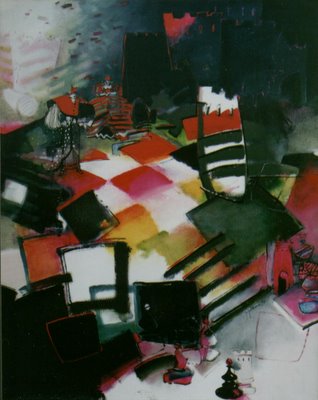This is the gambit I worry about....
 "Gambit Evansa" by Arden Szachy
"Gambit Evansa" by Arden Szachy
Iran is on a mission.
The question is: Is this their opening gambit?
From the Christian Science Monitor (thinking of Jill Carroll and praying for the best possible outcome for her. The CS Monitor has good, in depth reportage because of brave people like her.) Is the biggest threat Iran poses to the United States really its nuclear ambitions - or is it petropolitics?
Last month the Iranian government quietly reaffirmed plans to create by next year a euro-denominated exchange in oil, natural gas, and other petroleum products. If successful, such an exchange could start to lap at the walls of the two existing oil exchanges - London's International Petroleum Exchange (IPE) and the New York Mercantile Exchange (NYMEX) - both owned by American companies.
If the billions of dollars in oil sales ever got going in euros, experts say, that could dry up the demand for dollars that the heavily indebted US economy depends on, and it could mean big trouble for the US economy. It's enough to make the Great Satan-loathing visionaries behind the Iranian regime salivate. The chances of success, however, seem quite remote - at least in the short term.
So you say. I know traders and traders will walk over hot coals in panty hose if they think there's a chance to make some money. And you can bet the farm on that.
Iran probably stands to gain little from its talk of establishing a petro-euro exchange except for some propaganda value, say experts in energy markets.That's good. But the Iranian Gambit does not stop there:
"It's purely rhetorical," says Roger Diwan, managing director for oil markets at the Petroleum Finance Co. in Washington. "In order to have these [oil] contracts, you have to have a lot of people invest in them, and most of those people are in places like New York and London," he adds. "I don't see a lot of investors in New York deciding to shift [contract writing] from New York to Tehran." Mr. Diwan also notes that Iran is not alone in envisioning an oil exchange in the world's major oil-producing region. Dubai is also trying to create a market, he adds, but is not finding the way easy.
Indeed, the exchange proposal is not the only evidence of Tehran's geopolitical plottings. Experts note that Iran has approved huge energy deals with both India and China - deals that not only cement Iran as an energy power, but also could create powerful friends for Tehran's ambitions. Iran signed an agreement this year to provide India with liquefied natural gas over a 25-year period and signed a similar agreement last year to supply China with natural gas over a 30-year period. Both countries are in a deal to invest in and develop Iran's Yadaravan oil field - the kind of investment that US oil companies are prohibited from making because of US sanctions - while Iran presses to build a major pipeline through Pakistan to India. "Iran is definitely looking East, rather than West," says Mr. Seznec, "and that will matter."A friend in need is a friend indeed?
As for any plans to build an alliance of Asian countries against the West, experts note that its energy deals don't necessarily mean that Iran can count on its new oil partners as political allies, experts say. But they also note that already Iran is thought to have little to fear from any eventual referral of its nuclear program to the United Nations Security Council because of its ties to Russia and China, both permanent Council members.And there's the rub.
Why wait? Khazestan Gambit. Pronto.





|